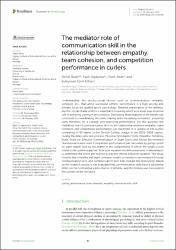| dc.contributor.author | Bedir, Deniz | |
| dc.contributor.author | Ağduman, Fatih | |
| dc.contributor.author | Bedir, Fatih | |
| dc.contributor.author | Erhan, Süleyman Erim | |
| dc.date.accessioned | 2023-05-06T17:22:09Z | |
| dc.date.available | 2023-05-06T17:22:09Z | |
| dc.date.issued | 2023 | |
| dc.identifier.issn | 1664-1078 | |
| dc.identifier.uri | https://doi.org/10.3389/fpsyg.2023.1115402 | |
| dc.identifier.uri | https://hdl.handle.net/20.500.11776/12079 | |
| dc.description.abstract | Understanding the psycho-social factors such as communication, empathy, cohesion, etc., that affect successful athletic performance is a high priority and primary focus for applied sports psychology. Detailed examination of the athletes' psycho-social characteristics is essential in revealing which processes play an active role in achieving optimum performance. Developing these features of the athlete can contribute to coordinating the team, sharing tasks, increasing motivation, preparing team members for a change, and improving performance. For this purpose, the mediating role of communication skills in the relationship between empathy, team cohesion, and competition performance was examined in a sample of 241 curlers competing in 69 teams in the Turkish Curling League in the 2021-2022 season. During the data collection process, Personal Information Form, Empathic Tendency Scale, Scale for Effective Communication in Team Sport, and Group Environment Questionnaire were used. Competition performance was calculated by giving 1 point for each match won by the teams in the competitions in which the single-circuit round-robin system is applied. Structural equation modeling was used in data analysis to determine the direct and indirect predictive effects between variables. The study showed that empathy and team cohesion predict competition performance through communication skills, and communication skills fully mediate this relationship. Based on the research results, it was evaluated that communication skills have a substantial effect on the competitive performance of athletes, and this finding was discussed in the context of the literature. | en_US |
| dc.language.iso | eng | en_US |
| dc.publisher | Frontiers Media Sa | en_US |
| dc.identifier.doi | 10.3389/fpsyg.2023.1115402 | |
| dc.rights | info:eu-repo/semantics/openAccess | en_US |
| dc.subject | curling | en_US |
| dc.subject | performance | en_US |
| dc.subject | team cohesion | en_US |
| dc.subject | empathy | en_US |
| dc.subject | communication skill | en_US |
| dc.subject | Physiological-Characteristics | en_US |
| dc.subject | Sport | en_US |
| dc.subject | Coach | en_US |
| dc.subject | Perception | en_US |
| dc.subject | Leadership | en_US |
| dc.subject | Framework | en_US |
| dc.subject | Deficits | en_US |
| dc.subject | Climate | en_US |
| dc.subject | Scale | en_US |
| dc.title | The mediator role of communication skill in the relationship between empathy, team cohesion, and competition performance in curlers | en_US |
| dc.type | article | en_US |
| dc.relation.ispartof | Frontiers In Psychology | en_US |
| dc.department | Fakülteler, Spor Bilimleri Fakültesi, Beden Eğitimi ve Spor Eğitimi Bölümü | en_US |
| dc.authorid | bedir, deniz/0000-0002-5926-3433 | |
| dc.identifier.volume | 14 | en_US |
| dc.institutionauthor | Erhan, Süleyman Erim | |
| dc.relation.publicationcategory | Makale - Uluslararası Hakemli Dergi - Kurum Öğretim Elemanı | en_US |
| dc.authorwosid | bedir, deniz/AAI-7698-2021 | |
| dc.identifier.wos | WOS:000953509700001 | en_US |
| dc.identifier.scopus | 2-s2.0-85149532142 | en_US |
| dc.identifier.pmid | 36874810 | en_US |



















